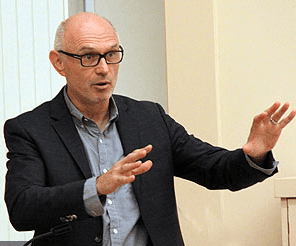 While some might call faith’s sphere of work is “secularization,” Miroslav Volf suggests the issue is larger and more penetrating: it is globalization. Slowing down the runaway dimensions of the globalization truck is the challenge of our faith, in fact, Volf says the world’s religions can cooperate at some level to challenge the relentlessness of reducing live to the globalized material way of life.
While some might call faith’s sphere of work is “secularization,” Miroslav Volf suggests the issue is larger and more penetrating: it is globalization. Slowing down the runaway dimensions of the globalization truck is the challenge of our faith, in fact, Volf says the world’s religions can cooperate at some level to challenge the relentlessness of reducing live to the globalized material way of life.
He argues this in his new important book, Flourishing: Why We Need Religion in a Globalized World.
Last week I suggested Miroslav Volf is the kind of public intellectual we need and the reason is because the problems today are global and religious, they are not just economic but are interpenetrated by the viability and reality of the faiths of Christians, Jews, Muslims, and Buddhists — and others. Public intellectuals who want to reduce it all to economic or to the material world are in fact part of the relentlessness of globalization, but at the same time they are failing to see the viability of religious faith and the necessity of religious faith to offer a flourishing vision for ordinary life.
So, let’s look at globalization, the ordinary life as the location of flourishing, and how faith can check globalizing and re-shape it in a direction that contributes to global flourishing (the good life and it’s far more than material blessings).
Globalization is inherently neutral: it is about interconnectivity, interdependence, contraction of space, speeding up of time, and perception of the world as one. Yet, the same globalization is not innocent because it leads to the exacerbation of all disparities and problems: the rich get richer and the poor get poorer, law spreads while crime does as well, cultural homogenization deconstructs local cultures, tradition is devalued, environmental improvements alongside colossal degradations, individualism complicated by awareness of the suffering of others, and technological marvels threatened by technological darknesses.
The original globalizers, Volf contends, are the missionaries of religions: Christianity, Islam, Buddhism. They contained the first universal ideologies. Thus,
Missionaries of world religions cross political and ethnic boundaries to call people everywhere to embrace the faith and to form transpolitical and transethnic religious ties. World religions establish networks that connect people on the basis of shared visions of the good life across the globe (38).
Religions saw the world as one; they sought a world unity centered on the faith.
The more pervasive globalizer today, however, has shifted: it is now the market. Both communism/socialism and capitalism are market-driven globalizers. Noticeably, Volf points his finger at the moral dimension of the market. Marx sees the market in negative terms; Adam Smith in positive terms, but both know it is moral.
1. The market’s operation assumes a view of human nature: choice, freedom, equality, responsibility… it commodifies the whole thing rooted in a view of human nature.
2. The market’s limits are shaped by the character of human life. “The logic of the market,” he says on p. 41, “is invasive; it seeks to colonize all times and all spaces of life, to turn all things into commodities, consumer goods to be bought and sold” (41). Its expansiveness is a morality issue.
3. The market’s effects require normative assessment. Again, a moral issue.
So, for Volf this is how globalization needs to be seen in our current climate: it refers to the “primarily market-driven and market-values-embodying-and-promoting” form of planetary interconnectivity and interdependence and a growing sense of humanity’s unity” (42). Notice how here globalization is neutral and ambiguous. It has promise — connection and relationship are goods — but it also has peril attending its every step. It brings promise and has helped the world, but it exacerbates the world’s problems and challenges.
The ground level of all of this is the ORDINARY LIFE. World religions can be dualistic at times and focus on transcendence, but world religions are also focused on the ordinary life. But globalization’s relentless attachment to the material life is winning. Our world’s faiths do care about the ordinary life but have had an ambiguous relation to ordinary life. Globalization, Volf contends, need religions to deliver it from its shadows.
Flourishing occurs at the level of the ordinary life or it doesn’t occur at all.
Globalization tends to pay no attention whatsoever to the transcendent realm. Genuine flourishing in the ordinary life only occurs in connection with God. Hence, the globalization processes are in need of being checked by the vision of flourishing in the world’s religions. (Is globalization today’s “invisible hand”?)
Volf shows that both John Paul II and the Dalai Lama believed humans have dignity, that justice and love are core virtues for all and that the good life occurs in relation to God. The proper relation to one another, then, must be humane — and this means the globalization must be checked by this vision of the humane. Authentic humanity then is shaped by connection with God and relationship with others in the world reflect that connection with God. Globalization restricts the good life to the ordinary life in a reductive sense.











